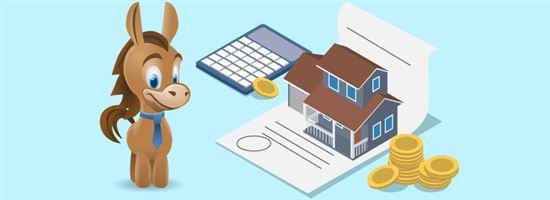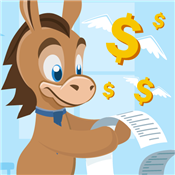Loan Origination Fee: What You Need to Know
One of the many charges you will see when getting a mortgage is the loan origination fee. What is it, and how can you minimize it? We'll tell you all about it.
 |
What Is Loan Origination?
Here's an easy explanation: Loan origination is the process of applying and processing a home loan. It starts with the first conversation with a loan officer. It concludes at the loan closing. Lenders charge a loan origination fee for the service they provide during the process.
What does this mean in dollars? It depends on how much you need to borrow. These fees usually fall between 0.5% and 1% of the loan. For a $250,000 mortgage, you'll pay $2,500 for the origination fee.
Just like it sounds, "loan origination" is the beginning part of loan. The fee is what covers the loan officer's work in securing your business, processing your application, and gathering information about your financial life. It's that information that determines whether you prequalify for the loan.
Lenders ask information about your
- Income
- Assets
- Liabilities
- Estimated credit score
This information gives the loan officer a look at your financial life. With this information, they can advise you about different loan programs.
After discussing your options, you choose a loan program and apply. This is when the real process begins.
Next, you must provide proof of the information you gave the loan officer. Lenders need:
- Personal identification information: The lender needs your full name, address, and social security number. They can then pull your credit.
- Proof of income: This includes paystubs and W-2s. If you are self-employed, you must provide tax returns and profit and loss statements.
- Asset documentation: This includes bank statements and investment account statements.
The loan officer evaluates the documents. He may run it through an automated underwriting system.
Loans with unique circumstances are sent to a manual underwriter. Once approved, the loan officer can issue a preapproval letter.
Loan Origination Fee Explained
 |
| © CreditDonkey |
The loan origination fee is like a commission you pay the lender. It's compensation for the lender's research. Generally, situations that are more complicated have higher origination fees.
The origination fee is what's considered "an upfront charge." So, this means you pay it in full at the closing - it does not get rolled into your loan to be paid out over time.
The origination fee is often written as a percentage. You may also see it labeled as a point. For example, a 1% origination fee, or 1 point, on a $200,000 loan equals $2,000. In some cases, though, lenders may charge a flat fee, such as $500.
You can see how much a lender charges on the loan estimate. Lenders must send this document to you within 3 business days of receiving your application. This document shows the following:
- Potential interest rate
- Monthly payment
- Estimated closing costs (including the origination fee)
You can view the origination fee on Page 2 of the loan estimate.
Average Loan Origination Fee
A general average loan origination fee is 1%. However, determining an average loan origination fee is somewhat difficult.
Many factors help determine the cost.
If you have a straightforward loan that most lenders will approve, your fee may be low. Lenders know you can go just about anywhere and get a loan approval. In this case, a lender may not charge an origination fee. If they do, it may be lower than the average.
Loans requiring a lot of work may require higher fees. Loans many lenders may not approve may have higher fees too. Lenders know which loans lenders will approve and which are riskier.
The riskier loans pose less competition for lenders. Because of the work involved and the risk of default, lenders can charge higher fees.
Another key factor is your loan amount. Smaller loans often have higher loan origination fees. This helps the lender make up for the low commission. The less you borrow, the less the lender makes. They make up for it by charging a higher origination fee.
How to Lower the Loan Origination Fee
Loan origination fees aren't required. Some lenders charge them and some don't.
You can often negotiate the fee. The more money you borrow, the more you can negotiate. After all, just because you're paying more for your house than the next person who comes into the loan office doesn't mean your application and paperwork took any more time or effort to process.
For example, let's say there are 2 loans - one for $500,000 and one for $150,000. Both borrowers have identical credit scores, income, and debt ratios. Generally speaking, they are low-risk loans. The lender they use usually charges 1 origination point. On the $500,000 loan, this means $5,000. On the $150,000 loan, this means $1,500.
There is a large difference between the two. If the work is identical, a lender may be more willing to negotiate the fees on the $500,000 loan than the $150,000 loan.
Even if the lender charged 0.5% on the $500,000 loan, they would still make $2,500. This is still $1,000 more than they would make on the $150,000 loan.
Lenders often agree to negotiate an origination fee when you take a higher interest rate. The origination fee doesn't lower your rate. However, it gives the lender a profit. If you ask for a lower upfront fee, they tend to increase the interest rate. This way they can make the money over the life of the loan.
What Does the Origination Fee Include?
Some lenders charge just the origination fee. Others itemize their closing costs along with the origination points. Each lender has a different method.
Itemized closing costs are the line items on your loan estimate. On Page 2, you'll see a breakdown of the fees charged. You may see any of the following:
- Points (percentage of your loan amount)
- Application fee
- Underwriting fee
- Processing fee
- Document preparation fee
Some lenders itemize the fees. Others charge one lump sum. You won't see the above charges. Instead, you'll just see points charged. The amount is usually larger than lenders who itemize the fees.
Since the housing crisis, governing agencies try to keep loan fees below 3% of the loan amount. This includes origination fees and all other itemized costs.
Can You Finance the Origination Fee?
The origination fee is a closing cost. Many loan programs don't let you finance those costs. They prefer the fees upfront.
An exception to the rule is FHA loans. As long as your loan doesn't exceed the maximum 96.5% LTV, you may include the fees in the loan. Many other loan programs, such as conventional loans, don't allow this.
There are other options, though.
If you can't afford the closing costs, you can talk to the seller. If he will negotiate a higher sales price for you, it may help. The higher sales price helps the seller give you a credit. This is called seller concessions.
It looks like the seller pays the closing costs. But you paid them by borrowing more money for the larger cost of the home.
Origination Fee vs Discount Points: What's the Difference?
Discount points are different. They are money you pay to lower your rate. In essence, you buy down the rate. This differs from origination fees. These points help lenders pay their bills. Some lenders use origination fees as commission for the loan officers.
Paying discount points isn't always worth it. You should consider your circumstances first. Look at the difference between the two rates. How much higher is the rate without the discount point? Usually lenders charge 1 point for each 0.5% decrease in the rate.
Here's an example:
John needs a $100,000, 30-year loan. He can have a 4.5% interest rate with no discount points. The monthly payment would be $507.
He can also have a 4.0% interest rate if he pays one point. The payment would be $477.
It's a difference of $30 per month, or $360 per year.
If John took the 4% interest rate, it would cost him $1,000 at the closing. It would take John almost 3 years to recoup that $1,000 with the $360 savings. If John will move in less than 3 years, the discount point won't help.
Does a Loan's APR Include the Origination Fee?
Knowing a loan's APR can help you choose the right loan. The APR takes into account the costs of closing the loan. This includes the origination fee.
Comparing a loan's APR helps you understand the true cost of the loan. It amortizes the fees along with the loan amount. This provides a better idea of the full cost of the loan over the term.
You shouldn't rely strictly on the APR or the interest rate. Instead, focus on the big picture. How much money do you need at the closing? What will the loan cost each month? What are the exact closing costs?
What Other Fees Do Borrowers Incur on a Mortgage?
Today, you can expect to pay between 2% and 6% of your loan amount in closing costs. On a $250,000 loan, this means up to $15,000. Some of the common closing costs include:
- Processing
- Underwriting
- Document preparation
- Credit report
- Appraisal
- Attorney
- Tax service
- Flood certification
- Title insurance
- Recording
- Wire transfer
Are Closing Costs Negotiable?
Just like the origination fee, sometimes you can negotiate your closing costs. The more you borrow and the stronger your loan file, the more you can negotiate. Lenders know when you can go elsewhere. If they want your business, they will negotiate the closing costs.
Certain costs, such as third-party fees, can't be negotiated. These include credit reporting fees, flood service, and tax monitoring. You can often shop title companies and appraisers, though. Talk to your lender first to see if they allow this.
More Facts About the Origination Fee
- Lenders often charged as much as 4 or 5 points on subprime loans before the housing crisis. Today this practice isn't allowed. Most lenders can't charge more than 3 points on any type of loan.
- Borrowers staying in their home benefit more from origination fees and discount points. They often get a lower interest rate. Paying the lower interest over 30 years can mean larger savings.
- You can pay an origination fee on a purchase or refinance loan.
- You only pay the origination fee if you close on the loan. Lenders can't collect the fee if the loan falls through before it closes.
- Don't look only at the origination fee on loan offers. Look at the interest rate and total closing costs too.
- You must pay origination fees and closing costs with a cashier's check. Lenders can't accept personal checks or cash.
- The origination fee and closing costs aren't your down payment. They are separate fees. You must prove you have enough funds for both.
- Your lender may report the points you pay on a loan on Form 1098. Talk to your tax advisor to see if they are tax deductible.
- Even borrowers with excellent credit may pay an origination fee. Don't assume you won't pay the fee. Always look at your Loan Estimate.
- Both banks and mortgage brokers charge origination fees. Don't assume your local bank won't charge one.
The Bottom Line
Loan origination is a lengthy process, and lenders want you to compensate them for their time. But not all lenders charge the fee using the same name. Some itemize every fee. If you add up the costs, though, you'll see that they equal a percentage or two of the total loan amount.
Lenders must disclose all fees on the loan estimate. Use this as your guide when choosing a loan. Sometimes points are necessary. Make sure you can comfortably afford them. Also, make sure the loan is in your best interest.
Write to Kim P at feedback@creditdonkey.com. Follow us on Twitter and Facebook for our latest posts.





